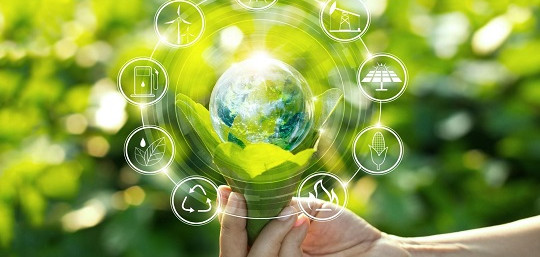
Sustainable Innovations Shaping the Future
As we commemorate the climate summit week, our focus today will be on Green Tech.
In a world increasingly aware of the urgent need for environmental sustainability, the Green Tech Revolution has emerged as a beacon of hope. Technological innovations are at the forefront of addressing the global challenges of climate change, resource depletion, and environmental degradation. This article explores the most impactful and promising sustainable technologies that are shaping our future.
1.Renewable Energy
Solar Power:
Solar panels have become a ubiquitous sight on rooftops worldwide. Advances in solar technology have led to increased efficiency and affordability, making it a viable source of clean energy for both homes and businesses.
Wind Energy:
Wind turbines harness the power of the wind to generate electricity. Offshore wind farms and innovative turbine designs are expanding the potential of wind energy.
Hydropower:
Hydropower has been around for decades, but modern innovations are making it more environmentally friendly and efficient, with smaller-scale hydro projects gaining popularity.
2.Energy Storage
Batteries:
Lithium-ion batteries have revolutionized energy storage, but there's a growing focus on developing sustainable battery technologies with longer lifespans and reduced environmental impact.
Hydrogen Fuel Cells:
Hydrogen is gaining traction as a clean energy storage solution, particularly for heavy industries and long-distance transportation.
3.Electric Vehicles (EVs)
Battery EVs:
Companies like Tesla and traditional automakers are producing electric cars with longer ranges, faster charging, and affordability, accelerating the transition away from fossil fuels.
Hydrogen Fuel Cell Vehicles:
Hydrogen-powered vehicles offer another alternative to traditional gasoline-powered cars, with zero emissions.
4.Smart Grids and Energy Management
Smart Meters:
These devices enable more precise energy consumption monitoring, encouraging energy efficiency and reducing waste.
Grid Integration:
Improved connectivity and management of renewable energy sources help balance supply and demand, reducing reliance on fossil fuels.
5.Circular Economy Solutions
Recycling Innovations:
Advanced recycling technologies are turning waste materials into valuable resources.
Sustainable Materials:
Bio-based and recycled materials are finding applications in construction, packaging, and more.
6.Urban Sustainability
Green Building Design:
Sustainable architecture and construction practices are creating energy-efficient, eco-friendly buildings.
Public Transportation:
Expanding and electrifying public transport networks reduces urban congestion and emissions.
7.Precision Agriculture
Smart Farming:
Sensor technology, AI, and data analytics optimize farming practices, reducing waste and environmental impact.
Vertical Farming:
Growing crops in controlled environments uses less land and resources, reducing the carbon footprint of agriculture.
8.Clean Water Technologies
Water Purification:
Advanced filtration and desalination technologies ensure access to clean, safe drinking water.
Water Conservation:
Smart irrigation and leak detection systems help reduce water wastage in agriculture and urban areas.
9.Carbon Capture and Utilization (CCU)
Direct Air Capture:
Innovative technologies capture carbon dioxide from the atmosphere, offering a potential solution for carbon neutrality.
Carbon Utilization:
Turning captured CO2 into valuable products like synthetic fuels or construction materials.
The Green Tech Revolution is transforming the way we live and do business, offering sustainable solutions to the environmental challenges we face. From renewable energy to clean transportation and circular economy practices, these innovations are not only reducing our carbon footprint but also creating a greener and more sustainable future for generations to come. Embracing and supporting these technologies is not just an option; it's a necessity for a healthier planet.
